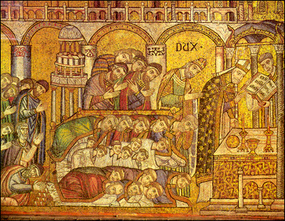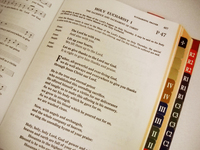 Père [Cardinal] Yves Congar, OP, in 1963 quoted by Geoffrey Hull in The Banished Heart (2010):
Père [Cardinal] Yves Congar, OP, in 1963 quoted by Geoffrey Hull in The Banished Heart (2010): Nothing is more educative for man in his
totality than the liturgy. The Bible is certainly a marvelous teacher of
prayer, of the sense of God and of the adult convictions of conscience. Used
alone, the Bible might produce a Christian of the Puritan tradition, an
individualist and even a visionary. The liturgy, however, is the
"authentic method instituted by the Church to unite souls to Jesus"
(Dom Maurice Festugière). The sort of Christian produced by an enlightened and
docile participation in the liturgy is a man of peace and unified in every
fibre of his human nature by the secret and powerful penetration of faith and
love in his life, throughout a period of prayer and worship, during which he
learned, at his mothers knee and without effort, the Church's language: her
language of faith, love, hope, and fidelity. There is no better way of
acquiring "the mind of the Church" in the widest and most interior
interpretation of this expression.
My friend, Father Mark posted this paragraph quoting Cardinal Congar from a recently published book, The Banished Heart (Continuum, 2010 - the link above takes you to the book) on his blog and I am shamelessly posting it here because I think it fully captures what this blog is about, and more importantly, what the Christian life is exactly about.


